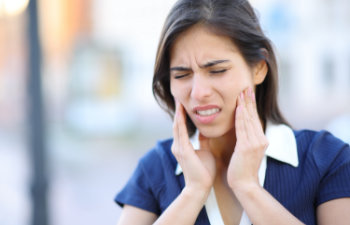
A sore in your mouth is hard to ignore, as it can cause nagging discomfort while eating, drinking, or speaking. Mouth sores can be a common concern, but they are not all created equally. Here are some different types of mouth sores and guidance on what to do if you have a mouth sore that won’t heal on its own.
Types of Mouth Sores
Mouth sores can take various forms, and understanding their differences can help you address them more effectively. Here are some common types:
Canker Sores (Aphthous Ulcers):
- Appearance: Canker sores are small, round or oval-shaped ulcers with a white or yellow center and a red border.
- Pain: They can be painful, especially when eating or speaking.
- Cause: The exact cause is unclear but may be related to stress, injury, certain foods, or underlying health conditions.
- Duration: Typically, canker sores heal within one to two weeks.
Cold Sores (Fever Blisters):
- Appearance: Cold sores are fluid-filled blisters that appear on or around the lips.
- Pain: They can be painful and are often accompanied by a tingling or burning sensation.
- Cause: Cold sores are caused by the herpes simplex virus (HSV-1) and are highly contagious.
- Duration: Cold sores usually heal within 7-10 days, but the virus remains dormant in the body and can recur.
Mouth Ulcers:
- Appearance: Mouth ulcers are shallow, gray or white sores with a red border.
- Pain: They can cause discomfort, particularly when eating or drinking acidic or spicy foods.
- Cause: Mouth ulcers may be linked to various factors, including injury, stress, and underlying health conditions.
- Duration: Most mouth ulcers heal within 1-2 weeks.
Thrush (Oral Candidiasis):
- Appearance: Thrush appears as creamy white lesions on the tongue, inner cheeks, and roof of the mouth.
- Pain: It may cause discomfort or a burning sensation.
- Cause: Thrush is typically caused by an overgrowth of the Candida fungus, often related to weakened immune function or antibiotic use.
- Duration: Treatment can help resolve thrush within a few weeks.
What to Do if a Mouth Sore Doesn’t Heal
While most mouth sores resolve on their own within a couple of weeks, some may persist or worsen. If you have a mouth sore that doesn’t heal within 14 days, it’s essential to seek professional dental care. Here’s why:
- Underlying Issue: Persistent mouth sores could indicate an underlying dental or medical problem, such as oral cancer, autoimmune disorders, or nutritional deficiencies. Early diagnosis and intervention are crucial for effective treatment.
- Reducing Discomfort: Your dentist can provide treatments or medications to alleviate pain and discomfort associated with mouth sores, allowing you to eat, drink, and speak more comfortably.
- Preventing Complications: Addressing persistent mouth sores promptly can help prevent potential complications and ensure your overall health is not compromised.
At Rivers + West Family Dentistry, our team is here to assist you with any oral health concerns, including mouth sores. If you have a mouth sore that doesn’t heal within 14 days or if you have any questions or concerns about your oral health, please don’t hesitate to contact us. Your oral health is our priority, and we’re committed to providing you with the best possible care and guidance to ensure your well-bein
Posted on behalf of
1065 Johnnie Dodds Blvd, Suite A
Mt. Pleasant , SC 29464
Phone: (843) 884-5166
FAX: (843) 849-0791
Email: frontdesk@mtpleasantdentists.com
Monday - Thursday 8AM - 5PMWe Break For Lunch From 1 - 2
